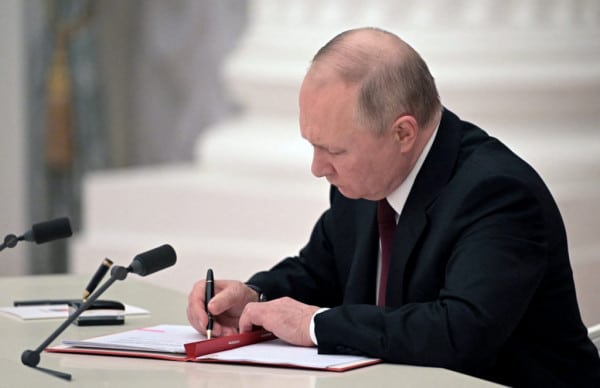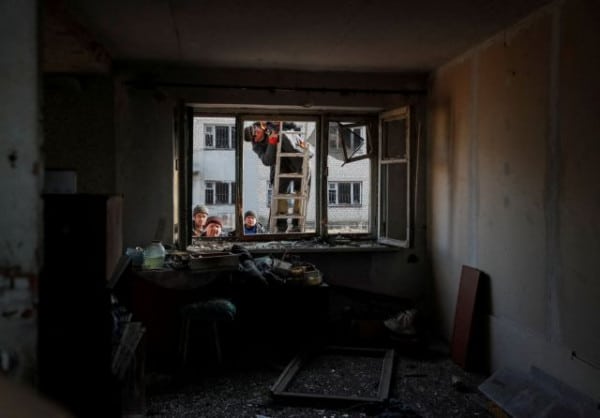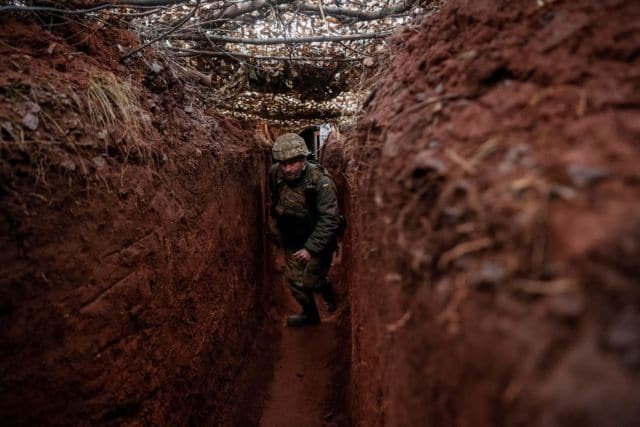At a time when fears of a general conflict in the region of Ukraine are growing, it seems that Russia is trying to energize the climate with a series of actions.
The West reacted with a barrage of sanctions against Russia after Putin's decision to recognize the two "People's Republics" in eastern Ukraine as independent.
The United States, despite initial cautious formalities, is now talking about "launching an invasion" of Ukraine, while for the time being it seems that top-level diplomatic initiatives are being buried that could de-escalate tensions in Ukraine.
At a time when fears of a generalized conflict in the Ukrainian region are growing, it seems that Russia is trying to boost the climate by sending a message to both the Ukrainian leadership and the West that it will not back down from its demands. of.
In this context, the reinforcement of Russian troops towards the eastern border of Ukraine continues.
The following video of the in shows a convoy of military support vehicles heading towards the eastern border of Ukraine.
"Initiation of the invasion" and fears of generalized escalation
Meanwhile, US President Joe Biden has complained that the green light given by the Russian parliament yesterday to launch a military operation in Ukraine marks "the beginning of an invasion" of the country.
Fears that a military escalation is imminent in Ukraine, which is said to have 150.000 Russian troops on its doorstep, according to Washington, have escalated after Vladimir Putin on Monday recognized the Lashkar Gah in eastern Ukraine, which are partly in the hands of pro-Russian separatists.
The Russian president is preparing "excuses to go much further", warned Joe Biden, 24 hours after the announcement of the critical decision of his counterpart. "There is still time to avoid the worst," he added.
In Moscow, Undersecretary of Defense Nikolai Pankov read out before the Senate the Russian president's request to deploy troops in Danietsk and Lugansk, because the Ukrainian army has deployed "60.000 men and armor" and is ready to attack.

In the counterattack, Putin
After receiving the approval of the parliament, Mr. Putin once again denounced the atrocities that Kiev is committing against the separatists in Donbas.
He casts doubt on the timing of the deployment of Russian forces in the field, calling for the "demilitarization" of Ukraine, which the "best" thing to do is to abandon its bid to join NATO and opt for "neutrality". .
"I did not say that our soldiers would go there now (…). "This will depend, as they say, on the situation on the ground." Shortly afterwards, Russian diplomacy announced that it would immediately withdraw its personnel from Ukraine.
Mr Putin also appeared to be claiming, on behalf of the separatists, all the Luhansk and Danieck regions, much larger in size than those in their hands. He spoke of alleged "negotiations" between Kiev and the pro-Russians.
The Russian operation will be legally justified by the ratification of the bilateral agreements on Tuesday, especially at the military level. Moscow also had diplomatic relations with the two People's Republics.
What concerns the West now is how far Putin will go. That is, whether it will remain on the issue of recognizing the "People's Democracies" or will claim other areas, thus further escalating the tension.
The Russian president, who has the initiative of the movements, mysteriously surrounds his intentions and choices: will he invade all of Ukraine? Will it expand the territories under the control of the separatists? Will it seek a new status quo through negotiations?
Enforcing the occupation could be costly, analysts say, and Russia basically wants to pull NATO out of its commitment to withdraw troops from Eastern Europe, especially medium-range missiles, and end its enlargement policy. Claims that to this stage the West rejects.

First sanctions
NATO expects a "major attack" by Russia on Ukraine, its Secretary General Jens Stoltenberg has warned.
Unexpectedly, Western countries announced the first sanctions, reacting to the recognition of the separatists with whom the Ukrainian army has been fighting for eight years. The conflict has claimed the lives of more than 14.000 people, according to Kiev.
The most spectacular move was announced by Berlin, which froze the giant project of the Nord Stream 2 gas pipeline, which would transport even more Russian gas to Ukraine.
In the White House, Joe Biden introduced a "first package" of sanctions aimed at preventing Moscow from lending to international markets to service its public debt.
The entire Russian banking sector could be targeted if Russia continues to invade Ukraine, a US official has said. "Together with our allies, we have cut off the Russian government, the Russian central bank and the Russian state coffers from any new funding from the US and Europe," said Dalip Singh, the White House deputy national security adviser.
For his part, US Secretary of State Anthony Blinken announced that he would cancel his scheduled meeting with his Russian counterpart Sergei Lavrov tomorrow.
"Now that we see that the invasion has begun and that Russia has clearly rejected diplomacy, a meeting at this stage makes no sense," Mr Blinken said.
Canadian Prime Minister Justin Trindade also announced a "series of sanctions" on Russia "until Ukraine's territorial integrity is restored."
The EU has earlier approved a package of sanctions that "will hit Russia hard", European Union Foreign Minister Giuseppe Borrell has said.
The British Prime Minister Boris Johnson also announced sanctions against three oligarchs near the Kremlin and five Russian sanctions, measures that are, however, a minima for London, which is frequented by many Russians with large fortunes.
He also said he was opposed to international sporting events in Russia, such as the Champions League final, which is scheduled to take place in late May in St. Petersburg.
These measures are still in place, but the West warns that they will be expanded in the event of a large-scale invasion.
At the same time, UN Secretary-General Antonio Guterres was sneering at Moscow, which is extremely rare, reminding us that "the principles of the UN Charter are not an a la carte menu" and that Russia must "fully comply". to them, as far as Ukraine is concerned, "it may not apply them selectively".
Moscow's recognition of the "so-called independence" of the separatist-held territories is a "violation of Ukraine's national integrity and national sovereignty," he added.
Ukrainian President Volodymyr Zelensky, whose government yesterday demanded "weapons" and guarantees for Ukraine's accession to the EU, said he was considering severing diplomatic relations with Moscow.
"We are not afraid"
For his part, Ukrainian Defense Minister Oleksiy Reznikov warned on Tuesday that his country was expecting "difficult trials" and losses.
On Monday night, President Zelensky insisted that Kiev was "not afraid of anything or anyone" and would not cede "even a shred of land" to the country.
At the front, the army and separatists continued exchanging fire yesterday. One Ukrainian soldier was killed and at least six others were injured in what became known as the Cold War.
Kiev denies any wrongdoing, contrary to what Moscow says, claiming that Russia is spreading false news to justify its intervention.
in.gr
